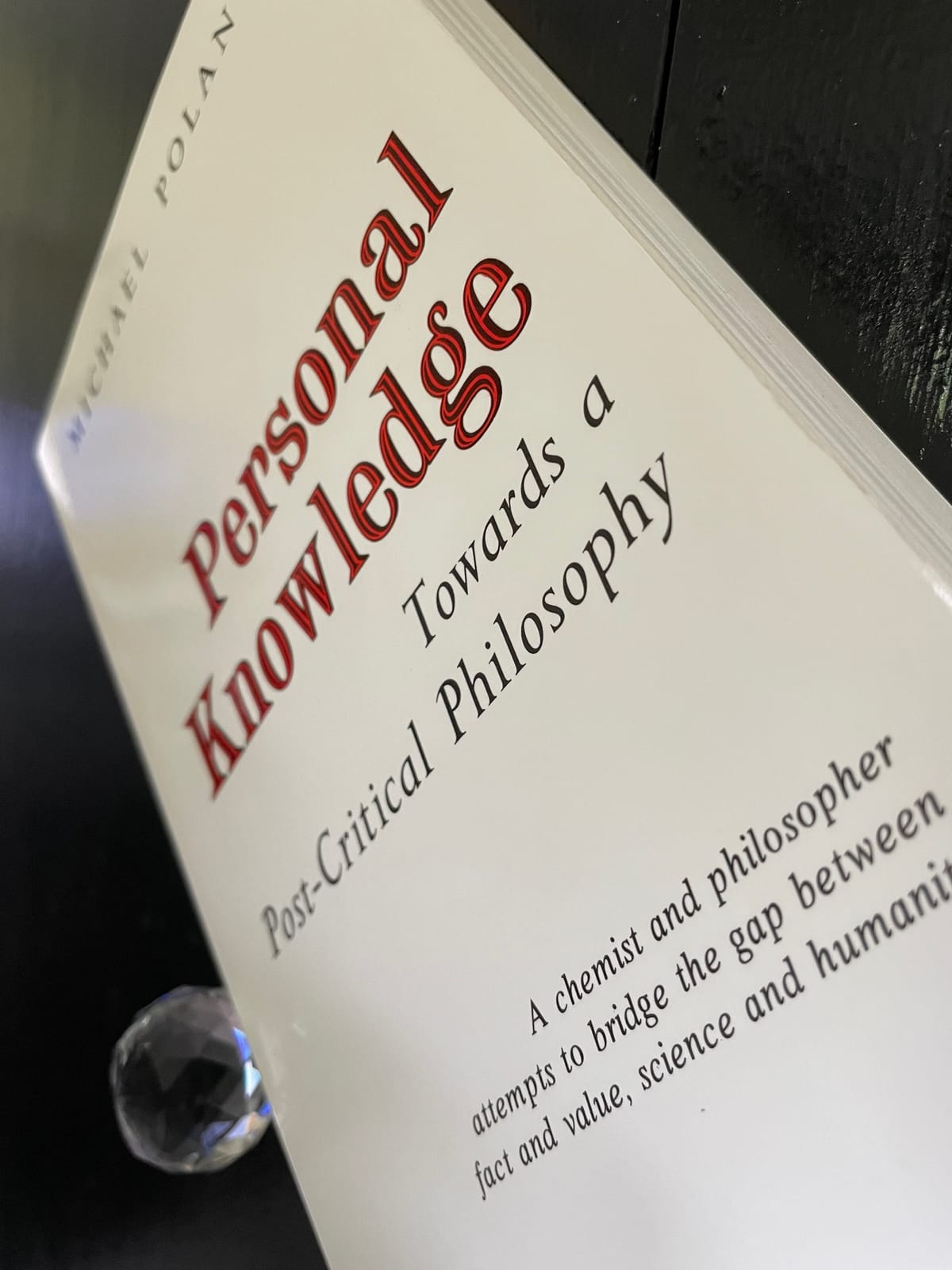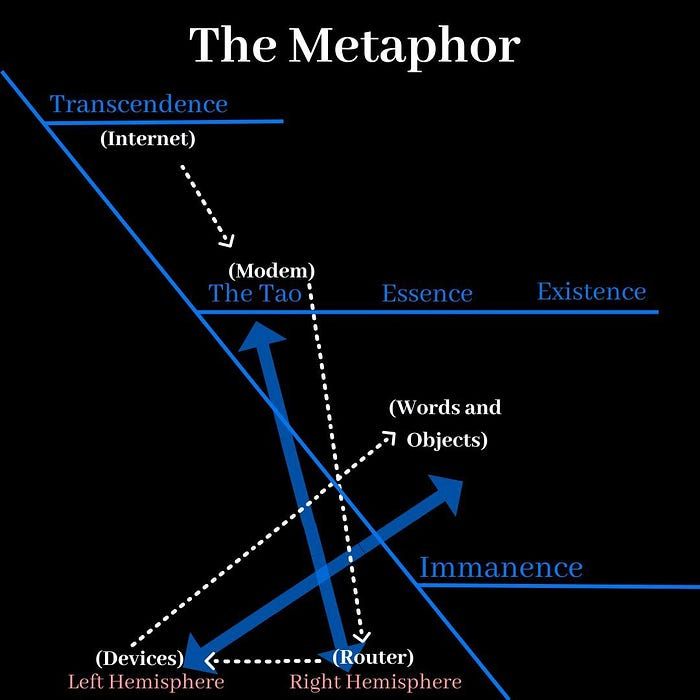Michael Polanyi's Personal Knowledge Anticipated Iain McGilchrist's Hemisphere Hypothesis
A few notes (a half-baked short essay) about the Hungarian chemist/philosopher and the English psychiatrist/philosopher

My Prompt
Iain McGilchrist, The Master and His Emissary (Yale, 2009)
Jerry J. Gill, The Tacit Mode: Michael Polanyi's Postmodern Philosophy (SUNY Press, 2000)
Micro-Bio
Michael Polanyi, Hungarian, 1891-1976. Baptized into the Roman Catholic Church in 1919. Hungary was (still is, relative to the rest of Europe) very Catholic back then. I don't know why he wasn't Catholic prior to age 28, but Tolstoy's confessions of faith and Dostoyevsky's Grand Inquisitor drove him into the Church.
He was a chemist and philosopher, holding positions at the University of Manchester, then at Merton College (where Tolkien taught), then around the United States, where he held visiting chairs at Wesleyan, Stanford, Duke, Virginia and UT Austin.
In 1958, he published his most important work, Personal Knowledge.
Personal Knowledge is Tacit
There's explicit knowing, implicit knowing, and personal knowing.
"Personal knowledge" is embodied knowledge. It's "embodied" in the sense that it's, well, bodily, attached to one's physical frame, coming out of the body. It's "embodied" in the sense that it's embedded: not objectively obtained from outside, but part of one's very existence, pre-existing any objective facts and emanating outward to grapple with facts coming inward from one's observations.
Knowledge is not, in other words, impersonal: an objective set of facts that the scientist (or any of us) grasps and applies in some sort of mystical "detached scientific mode." Knowledge is personal: explicit knowledge is ingested by an implicit field of knowledge that pre-exists it and that implicit field then uses the explicit knowledge to produce personal knowledge.
Personal Knowledge and the Hemisphere Hypothesis
McGilchrist doesn't mention Polanyi at all in The Masters and His Emissary and mentions him only four times (once, in a footnote) in the 1,500 pages of The Matter with Things.
But it seems Polanyi's philosophy anticipated McGilchrist's hemisphere hypothesis.
The left hemisphere is the hemisphere of explicit knowledge. It values the facts, often yielding them as ammunition in its worldly endeavors. It purports to "follow the science" and places absolute value in its "objective" conclusions.
The right hemisphere is the hemisphere of implicit knowledge. It knows objectivity is a fool's game: there is no such thing as completely "objective knowledge."
A Decade Before McGilchrist Published Master, a Professor Tied Polanyi to the Hemisphere Hypothesis
I was startled recently while re-reading pages from Jerry Gill's The Tacit Mode: Michael Polanyi's Postmodern Philosophy. He published it in 2000.
On page 61, he offers as an aside that he thinks Polanyi's insights relate to "recent work in brain physiology pertaining to what is known as the 'split-brain' phenomenon." He points out (as McGilchrist later elaborates (and elaborates and elaborates) on) that an "increasing amount of data" supports the theory that the human brain is structurally divided between its two hemispheres.
The left hemisphere, Gill says, "seems to be more involved in sequential and inferential thought," while the right hemisphere "deals more with 'lateral' thinking and gestalt awareness."
On the surface, it would seem that there exists an obvious correlation between this [split-brain] phenomenon and Polanyi's distinction between explicit and tacit knowing.
Explicit knowledge, says Gill, correlates directly with the functionings of the left hemisphere.
Tacit knowledge correlates with the functionings of the right hemisphere.
Moreover, tacit knowledge is the host and master of explicit knowledge. Tacit knowledge "provides the framework or context within which and out of which explicit knowing takes shape."
Tacit knowing, and thus the functions of the right hemisphere of the brain, must be admitted to be logically or conceptually prior to explicit knowing and the functions of the left hemisphere.
The Tao is Prior to Essence, which is Prior to Existence
Last Monday, I laid out the Reality Spectrum (the Tao, Essence, Existence) and pointed out that Essence is "prior to" Existence. I also wanted to write "the Tao is prior to Essence," but I wasn't sure that was accurate and, if it were, how.
And then Gill's words fell into my lap (I don't recall what prompted me to pull Gill's book off my shelf . . . I didn't even remember I had it).
The right hemisphere's functionings are prior to the left hemisphere's (which is one reason the left hemisphere is supposed to be the emissary . . . the master comes first).
The right hemisphere is the Tao's router. The Tao sends the signal to the right hemisphere, which interacts with the signal and applies the signal through the left hemisphere, making the right hemisphere (and, therefore, the Tao) prior to the left hemisphere and its explicit mode of knowledge through the essences.

Addendum: Cultural Differences
Gill points out that the split-brain phenomenon could explain the "culture/cognition paradox."
This paradox says, "All human brains are pretty much the same, but different cultures reach remarkably different conclusions about things." How does that happen..
According to Gill,
[T]he bipolar structure of the brain could allow for a given culture, or even subculture, to emphasize the development of the right or left hemisphere more heavily and to thereby produce widely different patterns of cognitivity without questioning the similarity of the brain structure.
That is exactly the problem McGilchrist is explaining. Our culture has become so dominated by the left hemisphere, everything we do and say is governed by its presumptions and dispositions, increasingly to the elimination of the right hemisphere . . . and its connection to the Tao.



